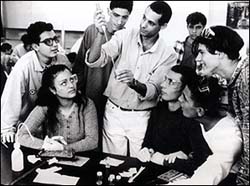
Starting Young - Aspiring scientists from the Druse village of Maghar experience research firsthand
Since particle accelerators, laser labs, submicron centers and solar towers can't be brought into the classroom, the Weizmann Institute's Field School of Science offers an attractive alternative: it brings the students to the campus where these advanced research facilities are located.
Nearly 5,000 high schoolers from every sector of Israel's population are participating in this year's Field School, run by the Institute's Youth Activities Section directed by Dr. Moshe Rishpon. They come for one to three days of intensive exposure to science presented by Weizmann scientists and graduate students.
"The Field School allows the students to experience science firsthand," says Dr. Netta Maoz, Deputy Director of the Youth Activities Section. "They carry out actual lab experiments in small groups, then draw conclusions in true scientific fashion."
Twenty-eight course themes are offered, spanning a broad range of modern research. The courses designed for science majors provide extracurricular enrichment and enhancement in areas where schools lack expertise or equipment. One such topic is "Chaos," which refers not to an unfortunate state of affairs prevailing in many classrooms but to a branch of science dealing with the behavior of various complex systems. Students who choose "Genetic Engineering Theory and Practice" conduct an extended experiment in which they isolate genes, implant them in bacteria that multiply overnight, and examine the function of the new gene in these bacteria; the experiment is followed by a discussion of ethical and societal aspects of modern biological research. The "Interaction of Light and Matter" is a program that combines aspects of atomic physics with such ecological issues as the hole in the ozone layer and the greenhouse effect. Another program probes the possibility of finding intelligent life elsewhere in the universe.
The courses that are geared to non-science majors include a three-day program on "Powers of Ten," in which students explore the universe through 45 orders of magnitude (powers of ten) -- from the tiniest elementary particles to the largest galaxy superclusters. The "Entertaining Side of Science" touches on logical paradoxes, experiments producing surprising results, optical illusions and the sex life of animals.
The Field School's activities are coordinated by Dr. Felix Laub and Batya Levy.
Groups staying overnight on the Institute campus are housed in the Laub International Science Youth Village, part of the Amos de-Shalit Youth Science Center. Efforts are now being made to expand the Field School facilities in order to increase the number of students participating in multi-day programs each year from 1,500 to 4,500, bringing the total annual number of Field School participants to around 8,000.
